- Home
- »
- Market Trend Reports
- »
-
Malaria Diagnostics: Trends And Competitive Landscape Analysis
![Malaria Diagnostics: Trends And Competitive Landscape Report]()
Malaria Diagnostics: Trends And Competitive Landscape Analysis
- Published: Aug, 2024
- Report ID: GVR-MT-100214
- Format: PDF, Horizon Databook
- No. of Pages/Datapoints: 25
- Report Coverage: 2024 - 2030
Report Overview
The malaria diagnostics market is evolving rapidly with a growing emphasis on point-of-care testing (POCT) for quick and accurate results, crucial for remote areas. Innovations such as the microfluidic point-of-care immunoassay highlight significant advancements, delivering results in just 15 minutes. Integration of AI and machine learning is enhancing diagnostic accuracy and speed, while telemedicine expands access to underserved regions. Non-invasive methods, molecular diagnostics, and technologies such as advanced rapid diagnostic tests (RDTs) and next-generation sequencing (NGS) are transforming the field. Leading companies such as Abbott Laboratories and bioMérieux dominate the market, supported by strategic collaborations and regulatory compliance. Emerging startups continue to drive innovation, ensuring broader accessibility and improved malaria management globally.
The trends analysis report, compiled by Grand View Research, is a collection of trends and competitive scenarios in more than 20 countries. Qualitative information regarding the industry trends, market opportunity, and competitive analysis will be provided in the report. Within the purview of the database, such information is systematically analyzed and provided in the form of outlook reports and summary presentations on individual areas of research.
Malaria Diagnostics: Emerging Trends, Technological Advancement, And Competitive Landscape Analysis Report Scope
Attributes
Details
Areas of Research
Industry trends, market opportunity, ease of doing business across countries, competitive analysis
Report Representation
Consolidated report in PDF format
Country Coverage
20+ Countries
Highlights of Report (by country)
- Emerging Trends
- Increased Focus on Point-of-Care Testing (POCT)
- Integration of AI and Machine Learning
- Expansion in Telemedicine and Remote Diagnostics
- Shift Towards Non-Invasive Testing Methods
- Rising Adoption of Molecular Diagnostics
- Technological Advancement
- Advancement in Rapid Diagnostic Tests (RDTs)
- Next-Generation Sequencing (NGS)
- Microfluidic Devices
- Multiplex Diagnostic Platforms
- Biosensors and Nanotechnology
- Competitive Landscape Analysis
- Market Leaders Analysis
- Key Players Strategic Initiatives
- Innovative Startups
- Regulatory Landscape
- Regional Market Dynamics
Malaria Diagnostics: Emerging Trends, Technological Advancement, and Competitive Landscape Analysis
Emerging Trends
Increased Focus on Point-of-Care Testing (POCT):
The focus on point-of-care testing (POCT) for malaria is growing due to the need for rapid, accurate, and portable diagnostic tools. POCT provides immediate results, which is crucial for prompt treatment, especially in remote and resource-limited settings. For instance, in March 2024, the microfluidic point-of-care (mPOC) immunoassay developed by Rice University detects Plasmodium falciparum histidine-rich protein 2 (PfHRP2) in just 15 minutes. This test is significantly faster and simpler to use than traditional methods, making it highly beneficial for rural healthcare facilities. The ability to deliver quick and reliable results at the point of care can significantly reduce the time to treatment, improving patient outcomes.
Integration Of AI And Machine Learning:
Artificial intelligence (AI) and machine learning (ML) are transforming malaria diagnostics by enhancing diagnostic accuracy and speed. These technologies enable automated image analysis and predictive algorithms that assist in identifying malaria parasites with high precision. For instance, AI-based tools can analyze blood smears more quickly and accurately than human technicians, reducing diagnostic errors and ensuring timely treatment. This integration is particularly valuable in areas with limited access to skilled laboratory personnel, ensuring consistent and reliable diagnostics.
Expansion In Telemedicine And Remote Diagnostics:
Telemedicine and remote diagnostic technologies are expanding access to malaria diagnostics in underserved regions. These innovations allow for the remote diagnosis and management of malaria, improving disease monitoring and response. The Malaria Case Notification (MCN) system in Zanzibar, for instance, uses mobile applications to report and manage malaria cases, facilitating real-time surveillance and intervention. Such systems are crucial for reaching remote areas where traditional healthcare infrastructure may be lacking.
Shift Towards Non-Invasive Testing Methods:
Rising Adoption of Molecular Diagnostics:
Technological Advancement
Advanced Rapid Diagnostic Tests (RDTs):
The development of advanced rapid diagnostic tests (RDTs) continues to improve malaria diagnosis. These tests are essential for quickly identifying malaria, even at low parasite densities. Recent innovations in RDTs have focused on enhancing their sensitivity and specificity. For instance, the Parasight-F test has demonstrated high sensitivity (90.9%) and specificity (94.3%) in detecting falciparum malaria, making it a reliable tool for malaria diagnosis in various settings.
Next-Generation Sequencing (NGS):
Next-generation sequencing (NGS) technologies are employed for detailed genomic analysis and identification of drug-resistant malaria strains. NGS provides comprehensive insights into the genetic makeup of malaria parasites, aiding in the development of targeted treatments and monitoring the spread of resistance. This technology is particularly valuable for research and public health initiatives aimed at controlling malaria outbreaks.
Microfluidic Devices:
Multiplex Diagnostic Platforms:
Biosensors and Nanotechnology:
Competitive Landscape Analysis
Market Leaders:
Key players in the malaria diagnostics market, such as Abbott Laboratories, bioMérieux, and Bio-Rad Laboratories, dominate the industry due to their strong global presence and extensive distribution networks. These companies invest heavily in research and development to innovate and expand their product portfolios, maintaining their competitive edge in the market.

Strategic Collaborations:
Collaborations between companies, research institutions, and government bodies play a crucial role in enhancing diagnostic capabilities. For instance, in November 2022, Sherlock Biosciences announced a licensing agreement with Shanghai-based Tolo Biotech. This agreement grants both companies co-exclusive rights to Cas12 and Cas13 CRISPR diagnostic methods in markets outside of the U.S. and Greater China. As the only two companies with rights to these method patents in the diagnostics market, this agreement strengthens the collaboration between Sherlock and Tolo, providing them with the most comprehensive portfolio of diagnostic CRISPR patents.

Innovative Startups:
Regional Market Dynamics:
Africa remains the lucrative market for malaria diagnostics due to the high disease burden. Additionally, Southeast Asia, led by India, is the second-largest region with high disease prevalence, the region's focus on improving diagnostic infrastructure and access to healthcare services contributes to its market growth.
Share this report with your colleague or friend.
GET A FREE SAMPLE
This FREE sample includes market data points, ranging from trend analyses to market estimates & forecasts. See for yourself.
![gvr icn]()
NEED A CUSTOM REPORT?
We can customize every report - free of charge - including purchasing stand-alone sections or country-level reports, as well as offer affordable discounts for start-ups & universities.
Contact us now to get our best pricing.
![esomar icon]()
ESOMAR certified & member
![ISO]()
ISO Certified
We are GDPR and CCPA compliant! Your transaction & personal information is safe and secure. For more details, please read our privacy policy.
We are committed towards customer satisfaction, and quality service.
Client Testimonials

"The quality of research they have done for us has been excellent..."
ISO Certified


